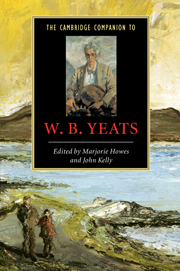Book contents
- Frontmatter
- 1 Introduction
- 2 Yeats and Romanticism
- 3 Yeats, Victorianism, and the 1890s
- 4 Yeats and Modernism
- 5 The later poetry
- 6 Yeats and the drama
- 7 Yeats and criticism
- 8 Yeats, folklore, and Irish legend
- 9 Yeats and the occult
- 10 Yeats and gender
- 11 Yeats and politics
- 12 Yeats and the postcolonial
- Bibliography
- Index
1 - Introduction
Published online by Cambridge University Press: 28 January 2007
- Frontmatter
- 1 Introduction
- 2 Yeats and Romanticism
- 3 Yeats, Victorianism, and the 1890s
- 4 Yeats and Modernism
- 5 The later poetry
- 6 Yeats and the drama
- 7 Yeats and criticism
- 8 Yeats, folklore, and Irish legend
- 9 Yeats and the occult
- 10 Yeats and gender
- 11 Yeats and politics
- 12 Yeats and the postcolonial
- Bibliography
- Index
Summary
Few modern writers have had careers as long, varied, and complex as W. B. Yeats. Born in 1865, he produced works that arguably belong to each of three major literary historical periods or traditions: the Romantic, the Victorian, and the Modernist. His thought was profoundly dialectical; for nearly every truth he made or found, he also embraced a counter-truth: a proposition that contradicted the first truth, was equally true, and did not negate it. He repeatedly remade himself as a writer, as a public figure, even as a person. And yet his life and work revolved around a few central preoccupations and themes: the Ireland of his day, the occult, sexual love, and the power of art to work in and change the world. In 1938, the year before he died, he wrote “The Spur” whose speaker accuses the reader of thinking it “horrible” that an old man should be filled with “lust and rage” and retorts “They were not such a plague when I was young. / What else have I to spur me into song?” (VP591). The continuity Yeats asserts here is both genuine and false. If we turn from this poem to the early poetry expecting to see the young Yeats lusting and raging, we will be disappointed. The explicit embrace of lust and rage is a feature of Yeats's later years, when he cast himself as the wild, wicked old man to avoid settling into any of the more comfortable poses available to him: the venerable sage, the elder statesman, or the famous poet. All these roles appealed to him, and he adopted each of them at times, but he also drove himself beyond them, towards more risky personae. As he put it in “An Acre of Grass,” “My temptation is quiet. / . . . Myself must I remake” (VP 575-6).
- Type
- Chapter
- Information
- The Cambridge Companion to W. B. Yeats , pp. 1 - 18Publisher: Cambridge University PressPrint publication year: 2006



